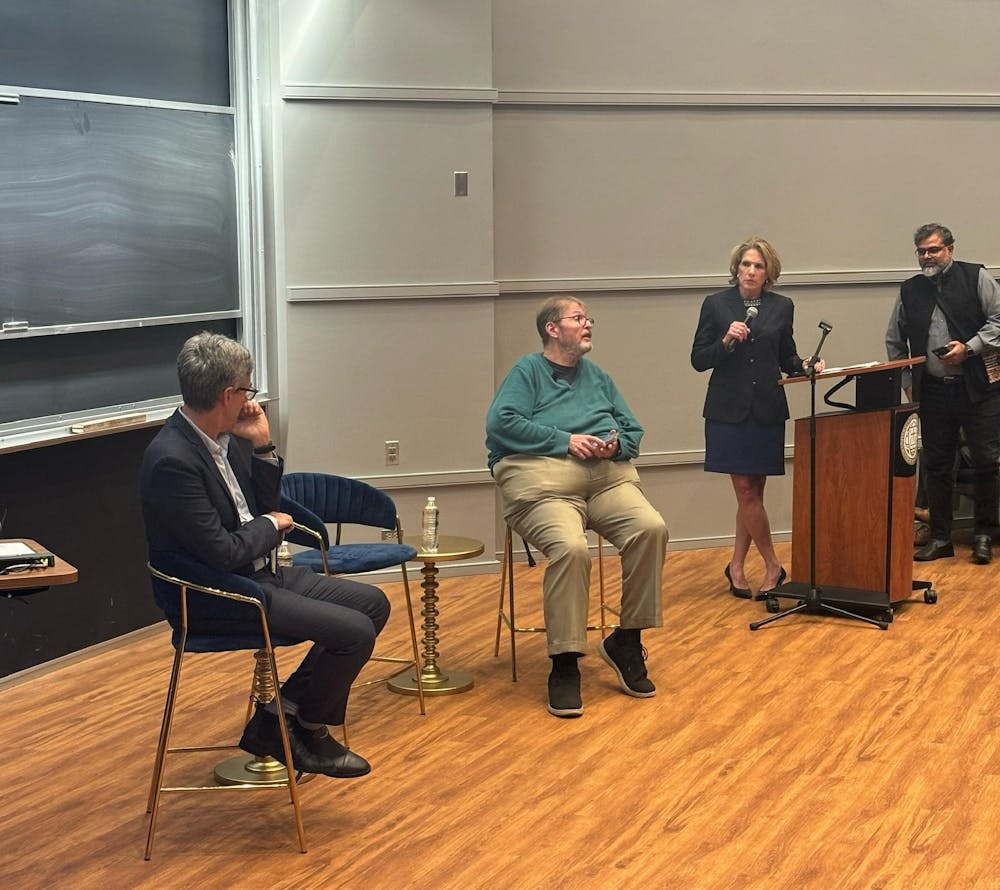On Wednesday evening, UCLA professor David Myers and Hussein Ibish, a senior resident scholar at the Arab Gulf States Institute, shared their perspective of the lead-up to Hamas’ Oct. 7 attack and the Israeli response in Gaza.
Ibish, a contributor to Bloomberg and the Daily Beast and the author of “What’s Wrong with the One-State Agenda,” established the basis of the forum.
“This is not a debate between a Jew and an Arab. That’s not the point. The point is we are in a conversation … what we are doing here is a mutual discovery,” Ibish said. “[It] is not about trying to win an argument, but rather to get at something deeper.”
Myers began with the founding of Israel in 1948. Myers, who also holds the Sady and Ludwig Kahn chair in Jewish history at UCLA, described the role of “collective trauma” as critical in perpetuating tensions in the region, commenting on the role the Nakba and Holocaust have played in the minds of the Israeli and Palestinian people.
“What we also see in this period is the clash of competing collective trauma,” Myers said.
Ibish added his own perspective on the role of the trauma, describing the extent of the Nakba and its impact on the Palestinian people.
“The Nakba is not just the displacement of 80% of the Arab population of the area that became the new state of Israel,” Ibish said. “It was the elimination of a whole society.”
The pair discussed internal politics in both Israel and Palestine just before Oct. 7, underscoring the impact of Israeli protests and the internal strife between the secular, Fatah-led Palestinian Authority and the Islamist Hamas.
“We both believe it is a moral imperative to condemn what occurred on Oct. 7,” Myers said. “There was no day that saw the murder of so many Jews since the Holocaust.”
Myers described the overwhelming Israeli response, noting Israeli Prime Minister Benjamin Netanyahu’s desire to inflict “mighty vengeance” for the attack alongside the magnitude of destruction in Gaza.
“The scale of destruction has been massive,” Myers said. "Over 40,000 Gazans have been killed, which includes a huge number of children.”
Ibish also discussed Netanyahu’s and Hamas’ strategies and what they may mean for the future of the conflict.
“The best way to stay in power is to keep the war going,” Ibish said. “So [Netanyahu] is not likely to agree to anything that will end it now.”
On the topic of Hamas, Ibish reiterated that the group's hijacking of the Palestinian cause was part of a grand strategy.
“Hamas wanted [this] from the beginning,” Ibish stated. “It wants to wave a bloody shirt every day and say, ‘We are the Palestinian national leadership, because we, and we alone, are fighting … for control of Palestinian land in Gaza.‘”
Though the discussion remained largely civil, the question of whether to use the term “genocide” emerged as a touchy subject. Eventually, several students stormed out of the room, disagreeing with Ibish and Myers’s decision not to use the term during their presentation.
Following the incident, Ibish explained their decision to omit the term.
“Whether the right word is genocide … I don’t know,” Ibish said. “But I have described [the conflict] in much more accurate terms, much more detailed and historical terms, than just throwing out the word genocide.”
For his part, Myers stressed the importance of dialogue and the consequences of the topic at hand.
“Over there, in Israel [and] Palestine, stakes are very high,” Myers said. “It is important to bring curiosity and genuine interest … as well as empathy.”










